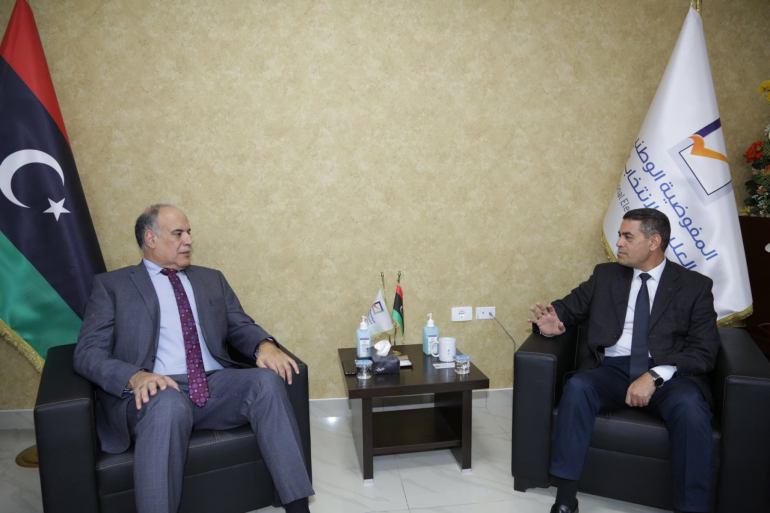Tripoli -
Al-Jazeera correspondent in Morocco learned that the Speaker of the Libyan House of Representatives, Aqila Saleh, and the President of the Supreme Council of State, Khaled Al-Mashri, are in Rabat to hold consultations with Moroccan officials, at a time when the parliamentary committee assigned by the Libyan House of Representatives continues its meetings to come up with a road map agreed upon by the Libyan parties, and that Following the faltering holding of the parliamentary and presidential elections on December 24 last.
Al Jazeera learned that Aguila Saleh and Khaled Al-Mashri have not yet held a direct meeting between them in the Moroccan capital, and informed sources reported that the consultations of the Libyan parties in Rabat are taking place mainly with Moroccan Foreign Minister Nasser Bourita, the heads of the two chambers of the Moroccan parliament and illiterate officials.
On the other hand, the Parliamentary Committee, the Supreme Council of State, the Presidential Council, the Constitutional Commission and various political, military and security parties and parties meet to expand the base of participation and listen to all opinions and proposals in order to get out of the political impasse resulting from the failure to hold the elections on time.
It is expected that the parliamentary committee will meet with members of the Constitution Drafting Assembly to discuss the reasons that prevented the draft constitution from being submitted to a popular referendum, in addition to the possibility of reconvening the Constitutional Drafting Assembly in the event that any amendments are requested.
The head of the parliamentary committee in charge of drawing up the road map, Nasr El-Din Mhenni, said that developing a clear and practical map will only be achieved with the participation of all political decision-makers, and communication with the influential in this decision.
The head of the parliamentary committee in charge of drawing up the road map, Nasr El-Din Muhanni, said that developing a clear and practical map will only be achieved with the participation of all political decision-makers, and communication with the influential in this decision.
Monday session
The House Speaker-designate, Fawzi Al-Nuwari, called the members of the House of Representatives to a session in Tobruk tomorrow, Monday, to listen to the briefing of the President of the High Electoral Commission, Imad Al-Sayeh, and members of the Commission on the reasons for the failure of the electoral process.
In the same context, the head of the High National Elections Commission agreed with Libyan National Security Adviser Ibrahim Bushnaf today, Sunday, that a number of legal and objective challenges prevented the completion of the elections on time.
The commission’s website stated that al-Sayeh and Bushnaf discussed in a meeting today, Sunday at the commission’s headquarters in Tripoli, the repercussions of postponing the presidential and parliamentary elections, urging everyone to show a spirit of responsibility to move Libya to the stage of stability. It was held as soon as possible.
The Head of the Electoral Commission (right) discussed with the Libyan National Security Adviser the repercussions of postponing the elections (communication sites)
Constitution Draft
A source in the Parliamentary Committee said that the meetings will continue in the coming days even after the House of Representatives holds a session tomorrow, Monday, to reach a quick roadmap, and it is likely to go to submitting the draft constitution to a referendum after addressing the contentious points contained in it.
The same source added to Al Jazeera Net, "The parliamentary committee will listen to the various actors that can contribute to resolving the current crisis, and then move on to develop a road map to get out of the political blockage."
The source stressed that there is a tendency among a group of Libyan parties to agree on a solid constitutional basis before going to the elections.
Member of Parliament Abdel Salam Nassiya said that the parliamentary committee "has decided to listen to all Libyan parties, and today we are meeting with the State Council to discuss the constitutional path and how to address it in light of the current crisis."
A text told Al Jazeera Net that these meetings require a broader participation of the actors, especially when talking about the constitutional path of the importance of involving everyone in it.
late awakening
Member of the Supreme Council of State Ahmed Naqi believes that "the awakening of the Parliament, even if it came late, is important at this time, given that Parliament has become more convinced that excluding the Supreme Council of State cannot lead to stability."
Naqi added to Al-Jazeera Net, "The committee formed by the House of Representatives to develop a road map will meet its counterpart from the Supreme Council of State to agree on election laws, and to consult on the possibility of making an amendment to the draft constitution submitted by the Constitutional Commission, by returning it to the body that issued it in the event of failure of consensus on the proposed amendments."
Naqi stated that it is certain that the two councils, after deliberating between them, will move towards the independence constitution for the year 1951, and stressed that the Supreme Council of State does not have specific conditions, except for consulting with it in all the powers granted by the political agreement signed in the Moroccan city of Skhirat to the two councils, and that the House of Representatives is not alone. Shared competencies between the two bodies.
The Libyans hope that the presidential and parliamentary elections will contribute to ending the armed conflict that has afflicted their oil-rich country, and ending the political and security division between the east and west of the country in the past years.

